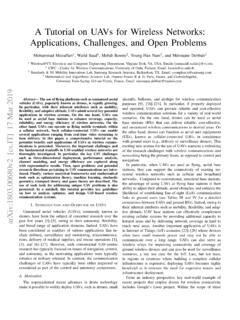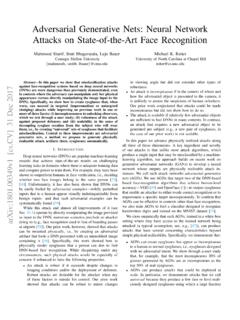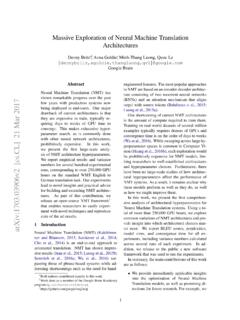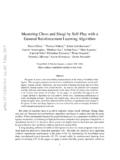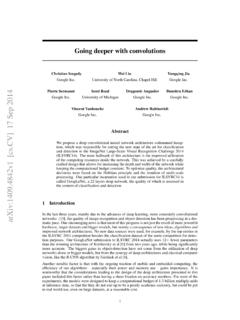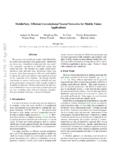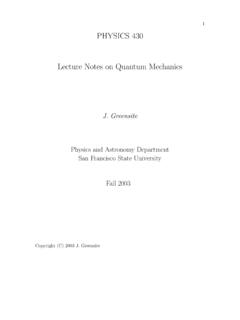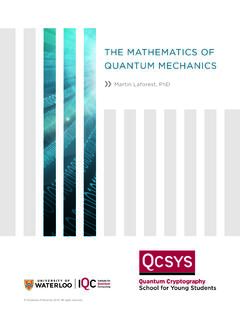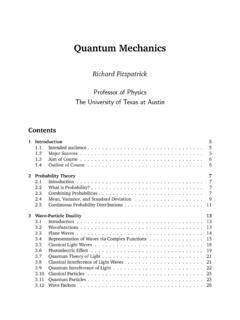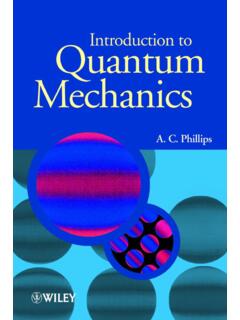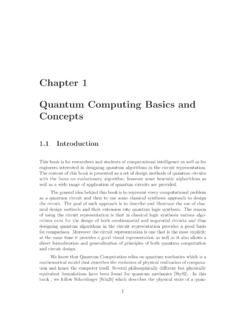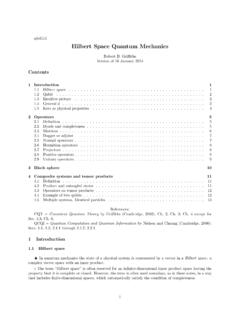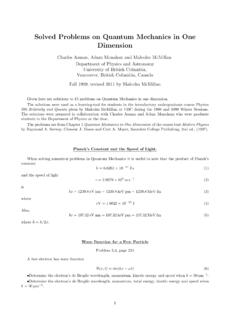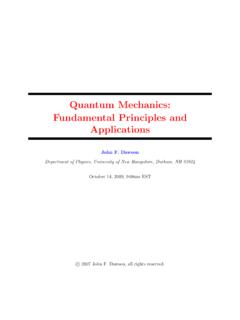Transcription of Randomness in Quantum Mechanics: Philosophy, Physics …
1 Randomness in Quantum mechanics : Philosophy, Physics and Technology Manabendra Nath Bera,1 Antonio Ac n,1, 2 Marek Kus ,3 Morgan W. Mitchell,1, 2 and Maciej Lewenstein1, 2. 1. ICFO-Institut de Ci ncies Fot niques, The Barcelona Institute of Science and Technology, E-08860 Castelldefels (Barcelona), Spain 2. ICREA-Instituci Catalana de Recerca i Estudis Avan ats, Lluis Companys 23, E-08010 Barcelona, Spain 3. Center for Theoretical Physics , [quant-ph] 17 Aug 2017. Polish Academy of Sciences, Aleja Lotnik w 32/44, 02-668 Warszawa, Poland This progress report covers recent developments in the area of Quantum Randomness , which is an extraordinarily interdisciplinary area that belongs not only to Physics , but also to philosophy, mathe- matics, computer science, and technology.
2 For this reason the article contains three parts that will be essentially devoted to different aspects of Quantum Randomness , and even directed, although not re- stricted, to various audiences: a philosophical part, a physical part, and a technological part. For these reasons the article is written on an elementary level, combining simple and non-technical descriptions with a concise review of more advanced results. In this way readers of various provenances will be able to gain while reading the article. CONTENTS meanings depending on the field of science it concerns. In this short introduction to our report we explain, in a very gen- I. Introduction 1 eral manner, why Randomness plays such an important role in II. Quantum Randomness and Philosophy 4 various branches of science and technology.
3 In particular we A. Epistemic and ontic character of probability 4 elaborate the concept of apparent Randomness , to contrast B. Randomness in classical Physics 5 it with what we understand under the name intrinsic random- C. Randomness in Quantum Physics 8 ness . 1. Contextuality and Randomness 8. 2. Nonlocality and Randomness 9. Apparent Randomness as an element of more efficient de- scription of nature is used practically in all sciences, and in III. Quantum Randomness and Physics 11 Physics in particular, cf. (Halmos, 2013; Khinchin, 2014; Pen- A. Quantum measurements 11 rose, 1979; Schr dinger, 1989; Tolman, 2010). This kind of 1. Postulates of QM 11. 2. Measurement theory 12 Randomness expresses our lack of full knowledge of the con- B. Nonlocality 13 sidered system.
4 Paradigmatic example concerns classical me- 1. Two-party nonlocality 13 chanics of many-body systems that are simply too complex 2. Multi-party nonlocality and device independent approach 14 to be considered with all details. The complexity of the dy- C. Randomness : information theoretic approach 15. D. Nonlocality, random number generation and certification 17. namics of systems consisting of many interacting constituents E. Nonlocality and Randomness expansion 18 makes predictions, even assuming perfect knowledge of initial F. Nonlocality and Randomness amplification 19 conditions, practically impossible. This fact motivates the de- velopment of statistical mechanics and thermodynamics. The IV. Quantum Randomness and technology 19. descriptions that employ probability distributions and statisti- V.
5 Quantum Randomness and Future 22 cal ensembles, or even more reduced thermodynamic descrip- tion, are more adequate and useful. Another paradigmatic ex- VI. Acknowledgements 23. ample concerns chaotic systems. In deterministic chaos the- References 23 ory, cf. (Bricmont, 1995; Gleick, 2008; Ivancevic and Ivance- vic, 2008) even for the small systems involving few degrees of freedom, the immanent lack of precision in our knowledge I. INTRODUCTION of initial conditions leads to the impossibility of making long time predictions. This is due to an exponential separation of Randomness is a very important concept finding many ap- trajectories, when small differences at start lead to large end- plications in modern science and technologies. At the same effects.
6 Also here, intrinsic ergodicity allows one to use the time it is also quite controversial, and may have different tools of statistical ensembles. 2. In Quantum mechanics apparent ( epistemic) random- predictions of the evolution of the systems with certainty. As ness also plays an important role and reflects our lack of full we shall see, in Quantum mechanics of composite systems, an knowledge of the state of a system. A state of a system in effective local hidden variable theories in general cannot be Quantum mechanics corresponds to a vector in a Hilbert space, used to make predictions about local measurements and the and is described by the projector operator on that vector. Such local outcomes are intrinsically random. states and the corresponding projectors of rank one are termed as pure states.
7 In general, we never know the actual (pure) Having defined the main concepts, we present here short state of the system precisely. Such situation may be caused by resumes of the subsequent parts of the report, where our focus our own imperfectness in determining the state in question. would be mostly on Quantum Randomness : Even, these may arise from measurements that result in sta- Quantum Randomness and Philosophy. Inquiries tistical ensembles of many pure states. The appropriate way concerning the nature of Randomness accompany Eu- of describing such states is using a density matrix, the ropean philosophy from its beginnings. We give a short probabilistic mixture of the projectors on the pure states. The review of classical philosophical attitudes to the prob- pure states are, simply, represented by those density matrices lem and their motivations.
8 Our aim is to relate them to that are just rank-one projectors. In fact, expressing Quantum contemporary Physics and science in general. This is systems, with a lack of the full knowledge about the state in intimately connected to discussion of various concepts question, constitutes the main reason of the introduction of of determinism and its understanding in classical me- the density matrix formalism (Cohen-Tannoudji et al., 1991;. chanics, commonly treated as an exemplary determin- Messiah, 2014). istic theory, where chance has only an epistemic status However, in Quantum Physics there is a new form of ran- and leaves room for indeterminism only in form of sta- domness, which is rather intrinsic or inherent to the theory. tistical Physics description of the world.
9 In this con- Namely, even if the state of the system is pure and we know text, we briefly discuss another kind of indeterminism it exactly, the predictions of Quantum mechanics could be in- in classical mechanics caused by the non-uniqueness of trinsically probabilistic and random! Accepting Quantum me- solutions of the Newton's equations and requiring sup- chanics, that is assuming that the previous sentence is true, we plementing the theory with additional unknown laws. should consequently accept that Quantum mechanics could be We argue that this situation shares similarities with that intrinsically random. We adopt this position in this paper. of Quantum mechanics , where Quantum measurement To summarize the above discussion let us define: theory la von Neumann provides such laws.
10 This brings us to the heart of the problem of intrinsic ran- Def. 1 Apparent ( epistemic) Randomness . domness of Quantum mechanics from the philosophical Apparent Randomness is the Randomness that results exclu- point of view. We discuss it in two Quantum aspects: sively from a lack of full knowledge about the state of the contextuality and nonlocality, paying special attention system in consideration. Had we known the initial state of the to the question: can Quantum Randomness be certified system exactly, we could have predicted its future evolution in any sense? exactly. Probabilities and stochastic processes are used here as an efficient tool to describe at least a partial knowledge Quantum Randomness and Physics . Unlike in classi- about the system and its features.
![arXiv:0706.3639v1 [cs.AI] 25 Jun 2007](/cache/preview/4/1/3/9/3/1/4/b/thumb-4139314b93ef86b7b4c2d05ebcc88e46.jpg)
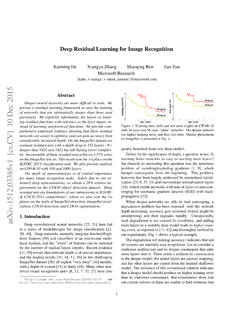
![arXiv:1301.3781v3 [cs.CL] 7 Sep 2013](/cache/preview/4/d/5/0/4/3/4/0/thumb-4d504340120163c0bdf3f4678d8d217f.jpg)
![@google.com arXiv:1609.03499v2 [cs.SD] 19 Sep 2016](/cache/preview/c/3/4/9/4/6/9/b/thumb-c349469b499107d21e221f2ac908f8b2.jpg)
